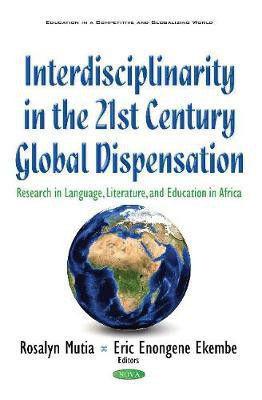Interdisciplinarity in the 21st Century Global Dispensation(English, Hardcover, unknown)
Quick Overview
Product Price Comparison
This peer-reviewed book adopts a multidisciplinary perspective to re-examine the complicated nature of societal challenges, resulting from mans quest for an increasingly reduced world. Chapter One discusses methodological innovations in teaching in Rwanda to postulate how culturally-adapted resources liberate learners from the top-bottom colonial pedagogy. Chapter Two derives from Virginia Woolfs To the Lighthouse to establish that human beings, as replicated by Woofs characters, seem to be much more defined by biochemical factors than by socioeconomic and cultural factors. Chapter Three posits the centrality of environmental factors in language learning in examining the effectives of instruction. Chapter Four exposes the double-edged international diplomacy, which victimised Sudan, and suggests solutions that anticipate the preventive diplomacy of the United Nations in the 20th and 21st centuries, with reference to D.H Lawrences The Rainbow. Chapter Five examines political discourses in Taylors The Land of the Saracen to show how a redefinition of orientalism experienced by early Americans leads to an ambivalent Americanised orientalism. Chapter Six reviews principle axioms of postcolonial theory asserts that literature teaching in Africa has shifted from exclusive literary dogmas to a multifactorial approach, which enhances human construction. Chapter Seven sees elderly people in Africa as mediators and socio-political mentors necessary for cross generational fertilization needed for sustainable development. Chapter Eight analyses ways through which both Nigerian and Cameroon English maintain their norm developing status according to Kachrus concentric circle. Chapter Nine argues that the Book of Genesis in the Bible venerates women, contrary to Christian attributes of betrayal. It argues that God is not wholly potent and must learn from the failings of his creation to perfect his art. Chapter Ten examines gender roles in Cameroonian myths to argue that new societal trends are offshoots of images constructed by myths. Chapter Eleven explores the bond between the English language and education and challenges linguistic imbalances that undermine 21st Century Africas educational system. Chapter Twelve discusses womens agentive roles in the spread of Islam evidence in Salman Rushdies The Satanic Verses and contends that Rushdie empowers female prophetess as a way of eliminating values of subjugation in which they find themselves. Chapter Thirteen contends that in postcolonial or postmodern contexts, rules on poetic drama may be an empirical farce as there is always a dramatic depiction of events, which portrays the poet dramatists impressions. Chapter Fourteen analyses the structure of negative constructions in a Bantu languageLimbumto propose an outer shell NegP and an inner core NegP contrary to common understanding. Chapter Fifteen argues that, the motives for which Cameroonians were made to learn English in state-run pilot linguistic centres have been submerged by the new global dispensation thereby contesting the relative value of the centres. Chapter Sixteen sees the emergence of a more Francophonised English in Cameron, which sets a new order for the definition of Cameroon English.


